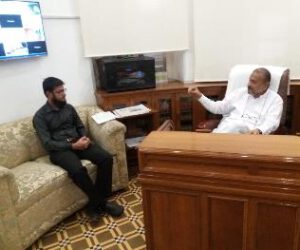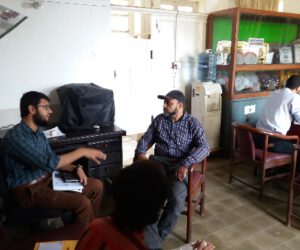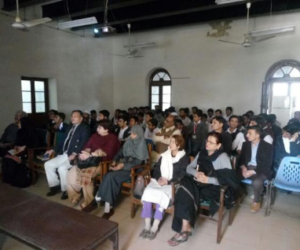Stakeholders Identification and Analysis
The major stakeholder groups are divided into primary and secondary groups based on the following two factors:
- The extent of impact of the project on the stakeholder group
- The extent of influence of the stakeholder group on the project
Primary Stakeholders – Direct Beneficiaries
The subproject area is an educational and cultural hub including education institutions such as DJ Science College, NED University City Campus, SM Arts and SM Law College and Cultural buildings such as National Museum and Burns Garden and Arts Council. There are five roads included in the subproject area which are used by the people attending the above institutions, transport providers (private rickshaws and a few public buses), and pedestrians walking from the neighborhood. These people are the direct beneficiaries of the subproject interventions and considered as Primary stakeholders.
Secondary Stakeholders – Indirect Beneficiaries
There are 30-35 households living in apartments and 25-30 shops on the ground floor of these apartments located along Dr. Ziauddin Ahmed Road and Strachan Road. The households and shops are not included in subproject area, but these shops and HHs use the subproject roads for commuting. Stakeholders also include, line agencies such as K-Electric, KWSB, SSGC and PTCL and Department of Antiquities, GOS, DMC South, Hindu Community and Transport Ittehad. These stakeholders are indirect beneficiaries of the subproject interventions and considered as secondary stakeholders.
Guide for Consultation – Base Matrix |
|||
| Information Shared | Feedback / Comments | Actions to be taken | Design Modifications |
| Background information of the subproject including parking plan | Problem of parking along the streets | Adequate parking space to be provided to cater the area vehicles parking | In addition to provision of 400 cars parking at Shahrah-e-Kamal, one lane of MR Kiyani Road and Dr. Ziauddin Road is dedicated for parking |
| Background information of the subproject including roads cross-sections | Access of locals and pedestrians in project interventions | Adequate and continuous access to be provided during construction to all project beneficiaries | Revised road cross-sections show that the proposed development on the roads will not utilize the whole width of existing roads and left footpath of varying width which will be used as access. |
| Background information of the subproject including development of student piazzas | Security measures should be provided at all pedestrianized places and student piazzas | Security measures i.e. CCTV cameras installation and monitoring, are already included in the plan | No need for design modifications. |
| Background information of the subproject including subproject interventions | Project delay and long construction time | CC and PIU to follow the subproject schedule in letter and spirit. Also construction along the roads and in the excavations should be completed as fast as possible. | – |
| Background information of the subproject including subproject interventions | Extensive measures should be taken during excavation of Shahrah-e-Kamal | Measures devised in section 6.3.3.9 to be implemented. | Protection of excavation through different technique is included in the design. |
| Background information of the pedestrian crossing and signals plan | Lack of traffic signals near educational institutions | Pedestrian signal crossings to be included near the educational institutions | No need for design modifications. |
| Background information of the subproject including parking plan | Unavailability Parking space for the students | Adequate parking space to be provided to cater the area vehicles parking | In addition to provision of 400 cars parking at Shahrah-e-Kamal, one lane of MR Kiyani Road and Dr. Ziauddin Road is dedicated for parking |
| Background information of the project including rehabilitation of roads plan and stormwater drainage | Road levels should not be increased from the buildings such that the stormwater makes ingress into the buildings. | Existing road levels to be maintained with proper stromwater drainage system | Already included in the design. |
| Background information of the project including rehabilitation of utilities | New water lines should be laid carefully and to avoid damaging existing lines. | While working near water mains, KWSB to be taken on-board and KWSB site engineers to be present at the site to locate the water mains. | – |
| Background information of the project including rehabilitation of utilities | Traffic rerouting should be implemented during rehabilitation of utilities. | Traffic management and rerouting plan to be developed by CC in consultation with GoS departments. | – |
| Background information of the project including rehabilitation of utilities | It is most important that the KWSB to be taken on board during construction and a site engineer of KWSB will be present at all times | It is to be ensured (letter of consent / MOU to be taken) before construction that KWSB is taken onboard during rehabilitation of water and sewerage | – |
| Background information of the project including rerouting plan in operation phase | Traffic congestion on roads | Reduction of traffic congestion by on-way traffic segregation | It is included in the design that to separate the traffic as one-way movement on main roads |
Consultation with Primary Stakeholders
For subproject area, a series of targeted consultations (interviews) as presented below were conducted with primary stakeholders. The summary of concerns of stakeholders raised during interviews is presented as follows:
Consultation with Muhammad Humayun, Principal, SM Law College – 15 September, 2017
The principal said that the development should be going on for the betterment of the area and the people. We are with the proposed project and present here to provide any support to the government if need be.

Consultation with Prof. Hafeez ur Rahman, Principal, Sindh Muslim Government Arts and Commerce College – 11 August, 2017
The Principal had an opinion that all the residential and commercial buildings must have their own parking. But now the buildings are constructed, the problem of parking existed. Regarding the development of student piazzas, the piazzas must not be closed with grills and can also be accessed by pedestrians. Also they should be monitored by CCTV cameras as to address law and order and security needs and concerns.

Consultation with Prof. Dr. Noman Ahmed, Chairman, NED University City Campus – 11 August, 2017
Dr. Noman had a view that ongoing Government of Sindh projects in the neighborhood should be linked with this project and an overall impact assessment for the whole Saddar or in fact Karachi will be assessed. ESMP Consultant explained that an ESMF has been developed for the interventions proposed under KNIP, to be implemented in select localities of Karachi.
Consultation with Prof. Shehzad Muslim Khan, Principal, D. J. Science College – 15 August, 2017
Prof. Shehzad Muslim had a view that due to the large pedestrian movement and traffic congestion in the area, people may suffer in case the project is delayed. It should therefore be completed on time and construction timeline should be limited as to lessen the time period of disturbance. He enquired about the potential impacts on the surrounding areas, if this area is uplifted and others left unattended. ESMP Consultant explained that the project will be implemented in overall Saddar and some other parts of Karachi after completion of this subproject. He was of the opinion that extensive measures should be taken during excavation of Shahrah-e-Kamal.
Consultation with DJ College, NED University and SM Arts College Students
Targeted consultations were conducted with students (name list provided below) of educational institutions located in subproject area (dates for consultations of each institution is provided in below table) and students were asked about the problems they are facing from the current situation of the area and suggestions they may have for the project during the construction phase.
- Damaged roads cause delays
- No traffic signal near college
- Traffic congestion
- Unavailability of seating arrangements for the students
- Unavailability Parking space
- Transportation
- Load shedding in the College
- In case of route diversion of public buses, students should be informed through notices or brochure prior to implementation to avoid trouble
- Work should be carried out in phases
- Plant shady trees
- Project should be completed within the specified timeline
- Construction around educational institutes should be completed as quickly as possible
- Provide parking space for students’ vehicles
- Water sprinkling to control dust pollution
Consultation Session with DJ Science College – 12 January, 2017
A consultation session was arranged at DJ College Conference Hall focusing Saddar area generally and subproject area interventions specifically. Following participants were participated in the session:
Faculty of DJ Science College …………………………………………. 06 Members
Students of DJ Science College …………………………………………50 Students
Discussion Points
Students described that they face problems like parking issues, no proper disposal system within the area etc. Traffic management, organizing parking, possible interventions such as enforcement of parking fee collection, adding cycling lanes, leveraging on municipal car parking structures could be option to cater the needs.
Almost every participant present in the Conference hall was touched that the idea should be focused for its present users who are mostly the Students but it can further be extended for tourists and others interested in socializing, cultural diversity, entertainment, and recreation etc.
Furthermore the students recommended the need of green areas, pedestrian friendly streets, increasing motivation for walkability, re-routing should be considered, existing vehicular patterns to be looked.
Almost all students agreed that the area be revived in accordance to its past glory which was dominated by its cultural diversity and intermixing of activities.
Principal DJ Science College then spread light over several issues like Traffic hazards faced by students, lack of organized open spaces, Unavailability of basic facilities like washroom, drinkable water, auditorium and other facilities to regard student facilitation.
Consultation Session with NED University – 24 November, 2016
A consultation session was arranged at NED (DAP) Conference Hall focusing Saddar area generally and subproject area interventions specifically.
Faculty of NED(DAP)…………………………………………. 20 Members
Students of NED (DAP)…………………………………………50 Students
Discussion Points
Students actively responded to the thought, they discussed how they feel walkability of the area should be improved, through proper infrastructure and making eco-friendly environment.
Most participants felt that we are losing the character of old town and some action be initiated to not just preserve them but also for their adaptive reuse and sustainably.
The discussion was made on how to knit destinations of public visitation in a manner that promotes improved public access and through facilitating patterns of circulation that are pedestrian in nature rather than motorized.
Dr. Noman Ahmed in few words comprehensively described the historical background of Pakistan Chowk.
Consultation with Government Servants, Teachers and education centers staff
Consultation team met male and female teachers and staff (on the dates as mentioned below) of DJ College, SM Law and SM Arts College as well as Government servants of National Museum and local council and briefed them about the project. They were already aware of the proposed project and pointed out the following problems facing by them in that area:
- Cleanliness issue and presence of no dust bin
- Transportation facilities are limited
- No bus stops
- No sweeping on the roads on regular interval
- No parks and sitting areas
- Poor lighting on roads
- No Parking space
The Staff suggested to address the above problems in the design of the project.
Mr. Mehmood, Mr. Rafique and Mr. Noor (KMC Charged Parking Employees, DMC South) has been consulted and briefed about the project. They said that the parking is managed by DMC South and if the government wants a development here, they will do it as DMCs are also working under GOS. We have no issues regarding the development as it should happen for the betterment of the area.










